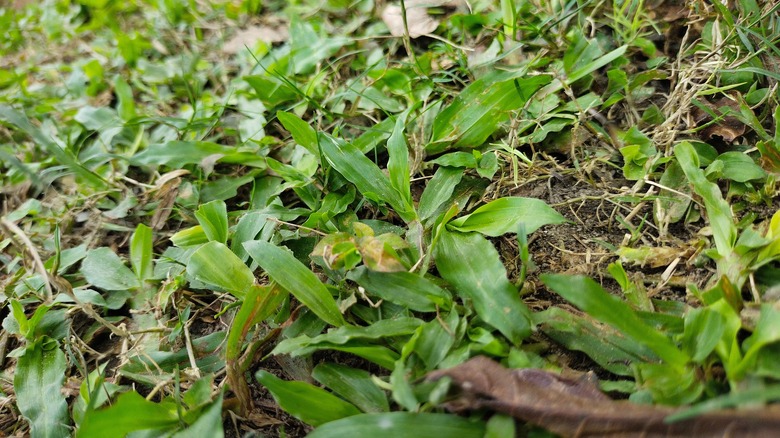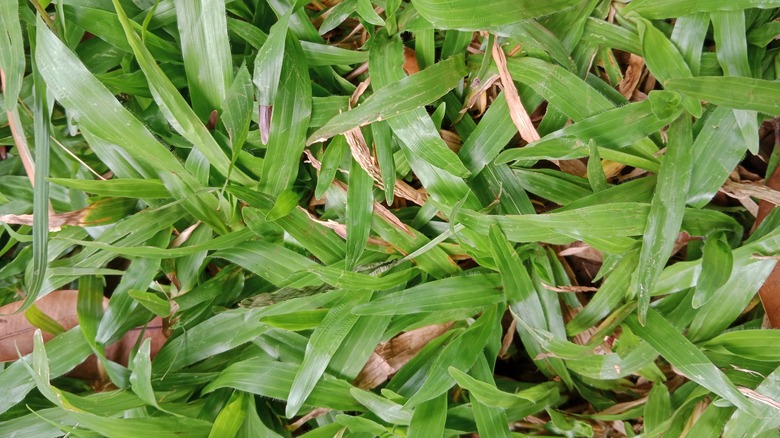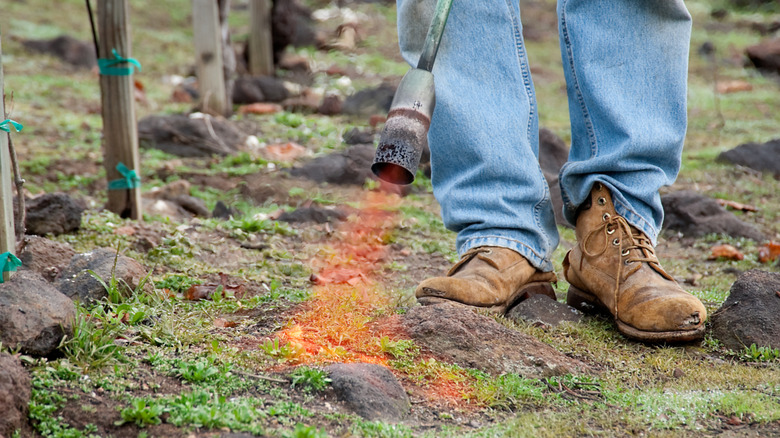The Best Way To Prevent Carpetgrass From Taking Over Your Yard, According To Our Landscaping Expert
While carpetgrass is sometimes planted as a turf grass in the Southeastern United States, it can easily become a pesky weed in non-carpetgrass lawns. As with any grassy weed, they can be hard to identify and get rid of, especially when they are constantly going to seed. Thankfully, the solution is pretty straightforward, and it lies in using a blowtorch or flame-weeding or using an organic, non-toxic herbicide.
As House Digest's Landscaping and Horticulture expert, I am going to let you in on some industry secrets that will save you time and money while protecting the planet from harsh chemicals and unsustainable practices. With 10+ years of experience in eco-friendly and traditional landscaping and horticulture, I've gained a plethora of knowledge when it comes to effective weed control. Furthermore, it is essential to do your research before implementing the latest weed-killing trend. Many sources will tell you it's okay to use harsh methods like vinegar or saltwater. However, I'm going to let you know that these methods will end up severely damaging your lawn in the long run. Sure, you may get rid of the weed you are trying to kill, but in the process, you're ruining the soil in that area for years to come. With all the misinformation about weed control on the internet, it is important to listen to the experts on what methods are tried and true. Here's what you need to know about using a blowtorch or organic herbicide for carpetgrass removal.
What is carpetgrass?
Carpetgrass (Axonopus affinis) is native to the Southern United States, Central America, and South America. It prefers poor-quality soils with little nutrients, can tolerate shade, and has a carpet-like growth habit. Because it does well in shady areas and infertile soils, it is often an excellent turf alternative for people who can't grow classic Southern turf grasses like Bermuda or Zoysia due to a lack of sunlight. If you're struggling to grow grass in your shaded yard, consider the benefits of using carpetgrass. This hardy species is praised for its ability to survive when all other grasses fail. However, its resilient and perennial nature can become problematic for homeowners growing other grass lawns.
Identifying any grass can be tricky, but carpetgrass is a bit easier to identify than other turf grasses. It is characterized by its creeping, mat-like growth habit, broad leaves (for a grassy plant), and flat stolons that can root at each node. Its seed stalks are slender and have an easily identifiable "Y" shape. Carpetgrass can be similar to crabgrass in appearance, and typically, they are both regarded as unwanted pests in the garden. For those homeowners who consider carpetgrass a nuisance rather than a saving grace, there are a few key ways to get rid of carpetgrass that won't harm your yard for years to come.
Safe and effective ways to get eliminate carpetgrass
Online sources will tell you to use small amounts of vinegar, salt water, laundry detergent, or other harsh chemicals to remove carpet grass. However, avoid vinegar, salt water, or other chemicals, that may permanently damage your soil and surrounding plants. These methods will kill the carpetgrass but leave you with an unappealing area of your lawn that will not grow anything for years to come. Additionally, they will poison the soil and kill the microbiology that makes the soil hospitable to plant life. Remember, soil is alive. Once contaminated and the biology in the soil is killed off, it takes years of remediation to make it healthy again.
There are safe alternatives to removing carpetgrass from your lawn. One effective, organic, and non-toxic method for getting rid of weeds is using a blowtorch or flame weeding. This all-natural weed control method is excellent for spot control as you can get pretty precise with it, and it kills the entire plant, including the root system. Another option is an all-natural, organic weed-killer solution like Avenger, which is available on Avenger Organics for $35 for a 32oz bottle. Unlike other organic herbicides, Avenger is made from a single ingredient, D-Limonene, derived from high concentrations of citrus peel. Once sprayed, the weed is dies within the hour without leaching toxins into the soil or waterways. To double up your defenses, you can burn first, and if the carpetgrass comes back, hit it with some Avenger.


